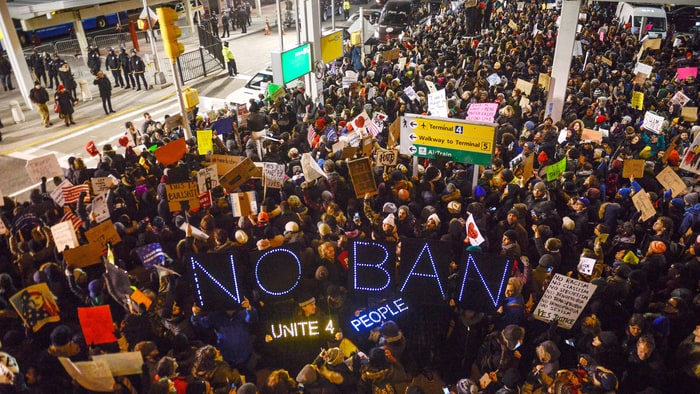 Back in February shortly after the initial rollout of the immigration ban affecting nationals of seven majority-Muslim countries, CBLDF joined with more than thirty other cultural and human rights organizations to condemn the ban’s impact on artistic freedom, collaboration, and the free flow of ideas. With this week’s news that the Supreme Court has partially lifted a stay that prevented the ban from being applied, our statement has been updated to stress that even a partial ban is unacceptable.
Back in February shortly after the initial rollout of the immigration ban affecting nationals of seven majority-Muslim countries, CBLDF joined with more than thirty other cultural and human rights organizations to condemn the ban’s impact on artistic freedom, collaboration, and the free flow of ideas. With this week’s news that the Supreme Court has partially lifted a stay that prevented the ban from being applied, our statement has been updated to stress that even a partial ban is unacceptable.
The Trump Administration’s second attempt at an immigration ban now applies to nationals of six countries–Iraq has been removed from the initial list–who do not already have “a bona fide relationship with a person or entity in the United States.” Immigration lawyers and rights organizations like the ACLU expect that will encompass only a small percentage of individuals, and to be clear the Supreme Court has not ruled on the legality of the ban at all; the justices expect to take up the case in October.
Nevertheless, our updated statement makes clear that the ban in principle and in practice betrays the American ideals of free expression and equality before the law:
On Monday, the Supreme Court reinstated a limited version of the Trump administration’s travel ban. Under the order, the administration can block ‘foreign nationals who lack any bona fide relationship with a person or entity in the United States’ from six mostly Muslim countries. It is uncertain how broadly that restriction will be implemented, but it is likely that the ban, even limited, will still adversely impact artists and cultural producers vulnerable for speaking out in repressive regimes. Those artists look toward the US as a place enabling them to work freely. At a time when cultural exchange is vital, the US should not be closing its doors to international artists, including those who dare challenge oppression in their home countries and who are, as a result, exposed to risks of retaliation.
Under this ban, some of the bravest and most endangered dissident artists whose stories we’ve covered on these pages could be barred from entering the United States — let alone seeking asylum here if needed. Some have already been forced into exile; one Syrian cartoonist died in prison; and others remain in their native countries under constant threat of reprisals for their work. They include:
Iran
- Eaten Fish
- Atena Farghadani
- Hadi Heidari
- Mahmoud Shokraye
- Mana Neyestani
- Bozorgmehr Hosseinpour
- Nik Kowsar
- Kianoush Ramezani
- Marjane Satrapi (dual French/Iranian citizen)
Syria
Sudan
Somalia
Libya
Check out our original joint statement against the immigration ban, as well as the full list of co-signatories who now number more than 40, here on the website of the National Coalition Against Censorship.
Help support CBLDF’s important First Amendment work in 2017 by visiting the Rewards Zone, making a donation, or becoming a member of CBLDF!
Contributing Editor Maren Williams is a reference librarian who enjoys free speech and rescue dogs.